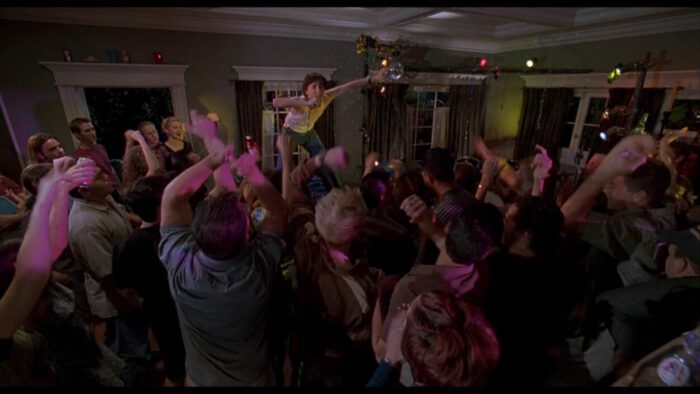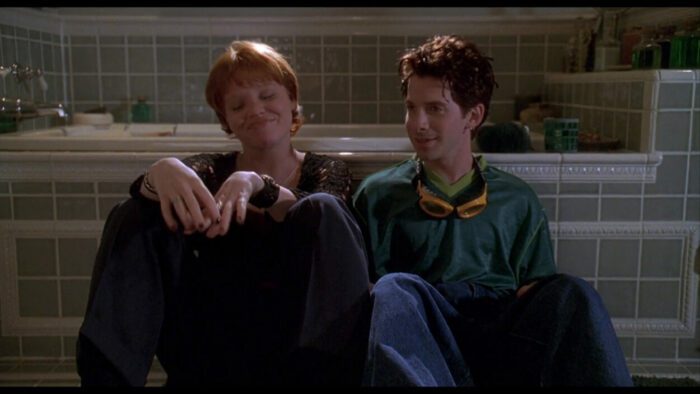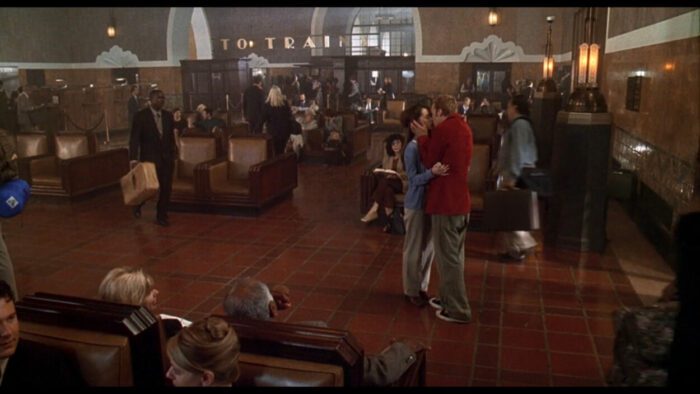Times change. This is a good thing. Progress is how we can evolve, and I would much rather evolve than stay stagnant in a world that is comfortable for me. After all, the world is so much more than me and my experiences. This is why I can look at a film like Can’t Hardly Wait and simultaneously consider two things:
1) I still love the movie. Yes, a lot of what I feel about the movie is nostalgia, but not all of it.
2) Critically speaking, the movie is definitely of its time, and that is both a good and bad thing.
Twenty-five years ago, I was psyched to see Can’t Hardly Wait. I was four years younger than the characters in the film, and I was about to start my freshman year of high school. Though the kids of Huntington High didn’t much resemble me or my classmates, it seemed like the kind of teen film I’d grown up with.
Like most of my age group, I grew up with the likes of John Hughes, so my teen film world was one of mostly (if not entirely, at times) white kids with problems not-so-similar to mine.
I never knew a Ferris Bueller, a John Bender, or even a Farmer Ted. Regardless, it was the spirit of the teen films I grew up with that meant something to me. I knew growing up and going to high school would have its challenges, and I felt, at least to some extent, prepared because of these films.
Little did I know that high school would be, for me, much more of a melting pot than the teen films I grew up with had me believe. If anything, it turned out that films like American Graffiti, Fast Times at Ridgemont High, and Dazed and Confused resembled my experiences more. Sure, there were cliques, but there were a lot of crossovers. I was one of those kids.
I knew someone from every circle, so I ended up identifying with the likes of Curt Henderson and Randall Floyd, once I saw those films (American Graffiti and Dazed and Confused, respectively) freshman year, so when I first read about Can’t Hardly Wait (originally simply titled The Party) in Entertainment Weekly, I figured it would be a throwback to those Hughes films.
And it would be. Of course, even 25 years ago, I knew it wasn’t as successful as those films, nor was it as successful as the 24-hour structure of the teen films mentioned above. There are a few reasons for this.

First, Can’t Hardly Wait was made in the late ‘90s and takes place in the late ‘90s. There’s nothing necessarily wrong with that, but I’d argue that part of what makes films like American Graffiti and Dazed and Confused work is that they take place in a time that no longer exists. The former film was made in the ‘70s but takes place in the early ‘60s. The latter takes place in the mid-’70s but was made in the early ‘90s.
I feel like Can’t Hardly Wait would’ve worked better had it taken place in the mid to late ‘80s or had been made in the late Aughts. This kind of approach allows for a critical look at a time and place. After all, if a character is called a homophobic slur and everyone laughs at that, having distance from the time period allows for the filmmakers to implicitly or explicitly comment on that part of American culture at the time.
As it stands, Can’t Hardly Wait is simply a product of its time. When Mike Dexter gets called the f-word near the film’s final act, the filmmakers are not telling audiences, “Hey, this was how it was back then. It was kind of messed up, right?” The filmmakers are simply using the word as it was used in the late ‘90s. Calling someone that word was a casual insult, and others laughing at that insult, generally speaking, of course, was not seen as a negative.
In this respect, this film can be seen as a successor to the John Hughes films. Though not nearly as iconic, the film is representative of the time it was made. Can’t Hardly Wait is a time machine. What did American pop culture look like in 1998? This film is the answer.
Before I continue, I should reiterate my feelings about this movie. I loved it 25 years ago, and I still love it now. Simply recognizing the movie’s flaws, and by extension, my own (then and now), does not translate to me bashing the movie. This is how criticism works. As I watched it to prepare for this piece, several things became clear, including the slur mentioned earlier.
Race is another thing where the film drops the ball. Unsurprisingly, I suppose, the six leads of the film are all white. That said, unlike the majority of John Hughes films, Can’t Hardly Wait populates its world without a lot of diversity. Yes, it’s a very white movie, but it would be disingenuous to suggest there are no other races or ethnicities represented in the film. Plenty get lines, and rarely is there a shot that is simply white character after white character.
All that said, it’s important to note that the film was certainly comfortable enough to throw in an n-word joke at the start of the final act. Part of the time period? Sure. Would the joke work now? Possibly. I do think having two white characters occupied with cultural appropriation saying the word to a group of black people as a sign of solidarity (without a hint of hate implied) can be funny, as is the immediate realization that they messed up, running away as the young black men chase them.
In its way, the film seems to, albeit briefly, comment on people like Kenny and his friends with both that moment and the exchange between Kenny and Denise in the bathroom where she calls out his poser nonsense, literally telling him, “There’s a mirror right there. Take a look, you’re white.”
Of course, the film doesn’t have the time to dwell on things like homophobia and race. To be fair, though, it shouldn’t have to. Not doing so does hurt the film, in my opinion, but it doesn’t hurt the stories being told.
Can’t Hardly Wait is about what seems like the entirety of the graduating class coming together at a party. We follow six specific characters as they navigate the night of their graduation.

Preston Meyer wants to tell Amanda Beckett his true feelings for her. His friend, Denise Fleming, tries to have a good time at the party Preston brought her to, and she ends up facing off with her childhood friend, Kenny Fisher, who wants to lose his virginity. Then there’s Mike Dexter, who has just broken up with Amanda, and slowly comes to the realization that that decision was idiotic. As for Amanda, she comes to her own realization that she’s more than simply the most popular girl in school who dated the most popular guy in school.
Let’s not forget William Lichter, whose plan to get back at Mike for all the bullying he gave him throughout their time at school results in him, mostly, having the night of his life. It’s classic over-the-top teen movie storytelling. William gets drunk and becomes the life of the party. He even seems to bond with Mike, but that exchange at the diner during the film’s final moments says otherwise. (Though I do believe Mike did bond with William, it seems he can never let go of looking “cool” in front of his friends.)
I will say that William’s revenge involves chloroforming Mike and a friend so that William and his two friends can undress them and take homoerotic photos of them. Yep. That’s the plan. And, I must say, I’m unsure how I feel about the odd poetic justice of William accidentally getting it at the end. Did he deserve that? Does anybody deserve that?
Look, Can’t Hardly Wait was made to be the ultimate teen film of 1998. There’s a reason there are so many familiar faces interspersed with newcomers, aside from the casting directors showing off their skills. It feels like one of those movies that’s like, “Here are a bunch of famous young people from the time. Isn’t it cool?” For nostalgia’s sake, kind of. I haven’t seen so many of these kids in so long that it’s nice to revisit them when watching this film.
The same goes for the music. I’m at that age where I find myself going back and listening to stuff I only listened to in high school. It takes me back. Whenever a ‘90s song kicks in that doesn’t get played on the radio anymore (yes, I still listen to the radio, both FM and XM), it takes me back to being 14 going on 15.
I wonder if that’s how people older than me feel when they watch the John Hughes film or stuff like Fast Times. Because, honestly, I can’t say I directly identify with anyone in Can’t Hardly Wait. Still, I recognize the spirit of who I was 25 years ago. I had friends all over the place, like Preston. I definitely had my Amanda, but unlike Preston, she never found out.

In 1998, I was a skinny Latinx kid with acne who loved movies. If there was a movie with characters around my age, I was there. I saw Can’t Hardly Wait in theaters, and when it came out on video, I watched it over and over. I couldn’t get enough. Until I got older. Still, I laugh at a lot of the jokes. I understand where a lot of the characters are coming from.
I recognize the stuff that is problematic, both then and now. It makes me feel uneasy, but I understand that the film is of its time. I feel like that’s how it is for most of us when we look back. We aren’t perfect. Even then we weren’t. But it would be bad to not recognize these things and learn from them. Did I use to laugh out loud at that homophobic slur? I did. Do I laugh now? No.
And yet, I can also recognize that nothing in the film seems to come from a bad place. The movie is meant to ultimately be joyful. It’s not particularly interested in being serious or critical. Good or bad, Can’t Hardly Wait is an important relic from 25 years ago, and it deserves to be remembered.




